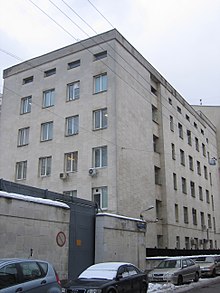Abuso político da psiquiatria na União Soviética
| Este artigo faz parte de uma série sobre a |
| Política da União Soviética |
|---|
 |
|
Governança |
|
Judiciário |
| Repressão na União Soviética |
|---|
| Geral |
|
| Repressão política |
| Repressão ideológica |
|

Na União Soviética, ocorreu um abuso político sistemático da psiquiatria[1] e se baseava na interpretação de que a dissidência política se tratava de um problema psiquiátrico.[2] Era chamado de "mecanismos psicopatológicos" da dissidência.[3]
Durante a liderança do secretário-geral Leonid Brezhnev, a psiquiatria foi usada como uma ferramenta para eliminar adversários políticos ("dissidentes") que expressavam abertamente crenças contrárias ao dogma oficial.[4]O termo "intoxicação filosófica" foi muito utilizado para diagnosticar transtornos mentais em casos onde pessoas discordavam da ideologia vigente ou faziam críticas ao governo.[4] O artigo 58-10 do Código Penal de Stalin — cujo artigo 70 fora movido para o Código Penal da RSFSR de 1962 — e o artigo 190-1 do Código Penal da RSFSR, junto com o sistema de diagnóstico de doença mental desenvolvido pelo acadêmico Andrei Snezhnevsky, criaram as condições necessárias sob as quais crenças fora da normalidade poderiam ser facilmente transformadas em processos criminais, e isto, por sua vez, em diagnósticos psiquiátricos.[5] Dentro dos limites da categoria diagnóstica, os sintomas de pessimismo, má adaptação social e conflito com as autoridades foram, por si só, suficientes para um diagnóstico formal de "esquizofrenia progressiva".[6]
A fé religiosa de presidiários, incluindo ex-ateus bem-educados que adotaram uma religião, foi considerada uma forma de doença mental e que precisava ser curada.[7]Documentos altamente classificados, publicados após a dissolução da União Soviética, demonstram formalmente que as autoridades usaram a psiquiatria como uma ferramenta para reprimir a dissidência.[8][9][10][11][12]
Mesmo após a caída da União Soviética, o abuso da psiquiatria na Rússia ainda continua[13] e ameaça ativistas dos direitos humanos com diagnósticos psiquiátricos.[14]
Ver também
- Artigo 58 (Código Penal da República Socialista Russa)
- Esquizofrenia progressiva
- Repressão política na União Soviética
Referências
- ↑ British Medical Association. Medicine betrayed: the participation of doctors in human rights abuses. Zed Books; 1992. ISBN 1-85649-104-8.
- ↑ Bloch, Sidney; Reddaway, Peter. Russia's political hospitals: The abuse of psychiatry in the Soviet Union. Victor Gollancz Ltd; 1977. ISBN 0-575-02318-X.
- ↑ Kondratev, Fedor [Фёдор Кондратьев]. Судьбы больных шизофренией: клинико-социальный и судебно-психиатрический аспекты [The fates of the ill with schizophrenia: clinico-social and forensico-psychiatric aspects]. Moscow: ЗАО Юстицинформ [Closed joint-stock company Justitsinform]; 2010. Russian. ISBN 978-5-9977-0014-9.
- ↑ a b Korolenko, Caesar; Dmitrieva, Nina [Цезарь Короленко, Нина Дмитриева]. Социодинамическая психиатрия [Sociodynamic Psychiatry]. Moscow: Академический проект [Academic Project]; 2000. Russian. ISBN 5829100150.
- ↑ Kovalyov, Andrei [Андрей Ковалёв]. Взгляд очевидца на предысторию принятия закона о психиатрической помощи [View of the eyewitness to the backstory of the adoption of the Mental Health Law]. Nezavisimiy Psikhiatricheskiy Zhurnal [The Independent Psychiatric Journal]. 2007 [cited 28 February 2014];(№ 3):82–90. Russian.
- ↑ Ougrin, Dennis; Gluzman, Semyon; Dratcu, Luiz. Psychiatry in post-communist Ukraine: dismantling the past, paving the way for the future. The Psychiatrist. 2006;30(12):456–459. doi:10.1192/pb.30.12.456.
- ↑ Pospielovsky, Dimitry. Soviet Anti-Religious Campaigns and Persecutions: Vol. 2 of A History of Soviet Atheism in Theory and Practice, and the Believer. New York: St Martin's Press; 1988. ISBN 0312009054. p. 36, 140, 156, 178–181.
- ↑ Gluzman, Semyon [Семён Глузман]. Украинское лицо судебной психиатрии [The Ukrainian face of forensic psychiatry]. Новости медицины и фармации [Medicine and Pharmacy News]. 2009a;15(289). Russian.
- ↑ Gluzman, Semyon [Семён Глузман]. История психиатрических репрессий [The history of psychiatric repression]. Вестник Ассоциации психиатров Украины [The Herald of the Ukrainian Psychiatric Association]. 2013a;(2). Russian.
- ↑ Voren, Robert van. Psychiatry as a tool of coercion in post-Soviet countries. The European Parliament; 2013a. doi:10.2861/28281. ISBN 978-92-823-4595-5. Russian text: Voren, Robert van [Роберт ван Ворен]. Психиатрия как средство репрессий в советских и постсоветских странах [Psychiatry as a tool of coercion in post-Soviet countries]. Вестник Ассоциации психиатров Украины [The Herald of the Ukrainian Psychiatric Association]. 2013;(5). Russian.
- ↑ Fedenko, Pavel [Павел Феденко]. The BBC Russian Service. Был бы человек, а диагноз найдется [A diagnosis is quickly found to attribute a person with]; 9 October 2009.
- ↑ Soviet Archives, collected by Vladimir Bukovsky. Выписка из протокола № 151 заседания Политбюро ЦК КПСС от 22 января 1970 года [The extract from the minutes No. 151 of the meeting of the Politburo of the Central Committee of the Communist Party of the Soviet Union of 22 January 1970]; 22 January 1970 [archived 14 May 2012; citado em 6 March 2014]. Russian.
- ↑ Voren, Robert van. Psychiatry as a tool of coercion in post-Soviet countries. The European Parliament; 2013a. doi:10.2861/28281. ISBN 978-92-823-4595-5. p. 16–18. Russian text: Voren, Robert van [Роберт ван Ворен]. Психиатрия как средство репрессий в советских и постсоветских странах [Psychiatry as a tool of coercion in post-Soviet countries]. Вестник Ассоциации психиатров Украины [The Herald of the Ukrainian Psychiatric Association]. 2013;(5). Russian.
- ↑ 15 лет Независимому психиатрическому журналу [15th anniversary of the Independent Psychiatric Journal]. Nezavisimiy Psikhiatricheskiy Zhurnal [The Independent Psychiatric Journal]. 2005 [cited 24 July 2011];(4). Russian.